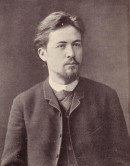 Each day this week, the blog will feature two letters. The one below was written by Anton Chekhov to publishing magnate Alexei Suvorin, his close friend, on Sept. 8, 1891:
Each day this week, the blog will feature two letters. The one below was written by Anton Chekhov to publishing magnate Alexei Suvorin, his close friend, on Sept. 8, 1891:
I have already moved to Moscow and am staying indoors. . . .
“The Lie,” the title you recommended for my long story, won’t do. It would be appropriate only in cases where the lie is a conscious one. An unconscious lie really isn’t a lie, but an error. Having money and eating meat Tolstoy calls a lie — which is going too far.
Yesterday I was informed that Kurepin is hopelessly ill with cancer of the neck. Before he dies the cancer will have eaten up half his head and torment him with neuralgic pains. I was told his wife has written you.
Little by little death takes its toll. It knows its job. Try writing a play along these lines: an old chemist has concocted an elixir of immortality — a dose of fifteen drops and one lives eternally; but the chemist breaks the vial with the elixir out of fear that such carrion as he and his wife will continue to live forever. Tolstoy denies immortality to mankind, but good God, how much there is that’s personal in his denial! The day before yesterday I read his “Epilogue.”* Strike me dead, but this is stupider and stuffier than “Letters to a Governor’s Wife,”** which I despise. The hell with the philosophy of the great of this world! All eminent sages are as despotic as generals, as discourteous and lacking in delicacy as generals, because they know they are safe from punishment. Diogenes spat into peoples’ beards, sure that nothing would happen to him; Tolstoy abuses doctors as scoundrels and shows his ignorance in regard to weighty questions because he is another Diogenes, whom you can’t take to the police station or call down in the newspapers. And so, the hell with the philosophy of the great of this world! All of it, with all its beggarly epilogues and letters to governors’ ladies isn’t worth a single filly in his “Story of a Horse.” . . .
Keep well and don’t forget this miserable sinner. I miss you very much.
Yours,
A. Chekhov
* The “Epilogue” to Tolstoy’s Kreutzer Sonata.
** Gogol’s Letters to a Governor’s Wife.

